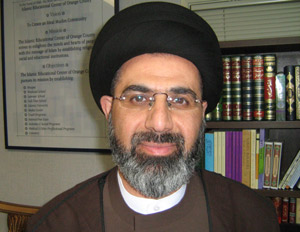Dignity
President Lyndon Johnson once said at a civil rights symposium:
I believe that the essence of government lies with unceasing concern for the welfare and dignity and decency and innate integrity of life for every individual. I don’t like to say this and wish I didn’t have to add these words to make it clear but I will—regardless of color, creed, ancestry, sex or age.
Dignity. Self-respect. Esteem.
When President Barack Obama insisted on including his middle name “Hussein” when he took the oath of office he sent a powerful message to Muslims, and it resonated, Imam Sayed Moustafa al-Qazwini told me this week when I interviewed him at the Islamic Educational Center of Orange County in Costa Mesa.
“I was so proud,” he said. “After eight harsh years of feeling rejected and marginalized by the previous administration, all of a sudden here’s this leader who emerges on the Capitol and declares his full name, and in his inaugural address he says he wants to rebuild and remake our relationship with the good Muslim world. It brought us a sense of hope and restored our natural place in American society.”
There was quite bit of hysteria during the election as some of Obama’s critics tried to use his middle name to score political points with the more xenophobic among us. Imagine how much that hurt those noble Muslim neighbors of ours, especially those named Hussein. Some Muslims named Hussein even started changing their names after that vicious dictator Saddam Hussein sullied the name.
One reason I really enjoy visiting the Imam at his mosque is because there’s always such a sense of Zen-like calm and devotion there. I get that same feeling at my parish church on Sundays. I don’t think it matters much how we worship God. To those of us with faith it just feels good to show our devotion. But I also appreciate how much I learn from the Imam. In fact, I learn so much from all of my friends who contribute to our weekly In Theory feature in the Daily Pilot. Right after I interviewed the Imam I stopped by Rev. Sarah Halverson’s twice-monthly Theology On Tap gathering at Karl Strauss Brewery in Costa Mesa.
Among the most memorable lessons from the Imam on this visit: Hussein is an especially important name to Muslims because Hussein was one of the Prophet Muhammad’s grandchildren. The Prophet had four daughters and only one had children, two of whom were boys, Hassan and Hussein. The root of the name Hussein is “goodness,” Al-Qazwini said.
Saddam Hussein was not born with that surname, Al-Qazwini noted. He appropriated it in one of his typical scams to elevate himself. Sadly, his murderous reign slurred the name.
“Unfortunately, after the first Gulf War that name was tainted in America,” Al-Qazwini said. “A lot of people started changing their names because they could not tolerate the degradation.”
But Barack Hussein Obama with just the utterance of his full name on a world stage helped erase that indignity.
A far cry from the days after 9/11 when Al-Qazwini went to Mecca twice, a religious pilgrimage known in the Muslim world as Hajj. There’s a mini-Hajj and a major Hajj, and Al-Qazwini went on both that year. Starting Sept. 12 that year for months he was booked to speak at churches and campuses everywhere, sometimes twice a day as he worked to convince people Bin Laden did not represent the true nature of Islam.
On his most recent trip to Mecca just after the Nov. 4 election, Hajj carried a different sort of significance, he said.
“We were approached by Muslims from other countries asking us, ‘How do you feel? Will this make a difference?’ And we would say, ‘We will wait and see.’ ”
At the Inauguration, Obama answered those questions, he said.
“During the last eight years we lost our dignity,” Al-Qazwini said. “We belong to this country but when you hear words like ‘Islamofascism,’ and ‘Islamic terrorists,’ and ‘radical extremist Islam,’ all the time you feel like an unwanted American.”














